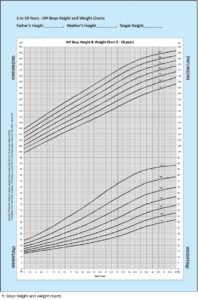When Roopali Bhasin came in for her 6-year-old son’s check up, she was visibly tense.
“When I saw my son’s class picture yesterday, I was disturbed to see that he was the shortest in the class” said Roopali.
“I used to feel he looked younger than most children his age but it was finally when I saw the class picture that I decided to get an expert opinion.”
Roopali‘s son Aryan was examined by a pediatrician, and his height, weight and BMI were noted to be short for his age.
He was then referred to Dr Manu Aggarwal, Pediatric Endocrinologist at Sitaram Bhartia.
Roopali had many questions when she met the pediatric super specialist.
What is Normal Height Gain in Children?
Children aged 4 to 9 years usually gain about 2 to 3 inches a year.
“You should remember that the growth of your child depends on many factors such as adequate nutrition and genetics,” says Dr Manu Aggarwal.
“Parents’ height is the single most important determinant of the genetic potential of height.”
How should I estimate the genetic potential of my child’s height?
You can use the simple formula below to estimate the potential height of the child or the mid parental height:
Boys: (father’s height + mother’s height) / 2 + 6.5 cm +/- 8.5 cm
Girls: (father’s height + mother’s height) / 2 – 6.5 cm +/- 8.5 cm
“Parents should monitor the growth of their child by plotting it on growth charts with the help of their pediatrician.”
You can use the growth charts below to assess the percentile of your child:
Growth Chart for Indian Boys from 5 to 18 years

Growth Chart for Indian Girls from 5 to 18 years
Source: Khadilkar VV, Khadilkar AV. Revised Indian Academy of Pediatrics 2015 growth charts for height, weight and body mass index for 5-18-year-old Indian children. Indian J Endocr Metab [serial online] 2015 [cited 2018 Sep 23];19:470-6Roopali was extremely worried when she was told Aryan’s was not as tall as he should be.
What Causes Short Height?
Amongst the many causes of short height, a few are:
- Nutritional deficiencies
- Genetics
- Hormonal or Endocrine disorders
When to Suspect Short Height in Children
The pediatrician suspected Aryan’s condition because he had grown only an inch from the previous year, as compared to the usual 2-3 inches for a child his age.
When to consult a Pediatric Endocrinologist
Consult a pediatric endocrinologist if your child demonstrates the following signs or you have been advised to do so by your pediatrician:
- Poor appetite
- Growth is less than 2 inches a year or has stopped growing
- Weight loss or sometimes gain
- Delayed signs of puberty
“It is important for you to get a medical opinion as early as possible, as treatment becomes not so effective or completely ineffective as the child grows older,” emphasizes Dr Manu.
Stop delaying that doctor’s visit and resolve all your doubts with our Pediatric Endocrinologist. Please call us on +91 8826391002 to schedule a consultation.
What can I do now that I know my child is short?
The treatment for children who are not growing adequately depends on the condition with which they are diagnosed.
Short Height due to Nutritional Deficiencies
If your child is diagnosed with malnutrition, the pediatrician will advise you on how to encourage a balanced diet and may also prescribe supplements.
Improper growth due to Hypothyroidism
In families with a history of hypothyroidism, it is common for children to be affected by the condition as well. Depending on their age, children may present different types of symptoms for hypothyroidism. Most often these include:
- Getting tired often
- Having dry skin
- Finding it difficult to pass stool
Other symptoms include:
- Being shorter than average
- Having shorter arms and legs
- Delayed permanent teeth
- Delayed puberty
“We usually advise blood tests to measure the thyroid-stimulating hormone (TSH) or thyroxine (T4) to confirm whether a child has hypothyroidism” explains Dr Manu.
The pediatrician endocrinologist will also feel your child’s neck to assess the presence of an enlarged thyroid. This is known as Goiter and may cause difficulty with breathing or swallowing.
If confirmed, the child would be started on thyroid hormone therapy on a daily basis.
Slow growth due to Genetic reasons
Children with a slow rate of growth due to genetic causes may also be advised growth hormone therapy.
Short Height due to Growth Hormone Deficiency
After a thorough examination, Aryan was advised blood tests.
The blood tests revealed that his pituitary gland wasn’t producing enough growth hormone.
Growth hormone deficiency may be present at birth or could be acquired after birth due to brain tumors, injections or injury. At times, there is no identifiable cause.
Symptoms of growth hormone deficiency include:
- Slow rate of growth as per child’s age
- Weight gain, especially around the waist
- Children may appear younger as compared to peers
- Teeth may develop late
“Growth hormone therapy aims to increase the rate of growth in children, their metabolism and their energy levels” says Dr Manu.
“Fortunately Aryan came to us at the right time, when there was adequate potential for growth.”
“As treatment is expensive, you have to make sure you follow it properly as it can be effective only if followed through,” cautions Dr Manu.
After a lot of discussion with the pediatric endocrinologist, and speaking to her husband and family, Roopali decided in favour of growth hormone therapy for her son.
Aryan was advised injections on a daily basis.
Follow up for Growth Hormone Therapy
Dr Manu monitored Aryan’s growth periodically. In the next two years Aryan showed tremendous improvement in growth and still continues to be on track.
In a recent follow up visit, Roopali shared “ I am so glad I didn’t take his short height lightly all those years ago. I made it a point to regularly check in with my pediatrician and pediatric endocrinologist, who both worked in sync, and made it easier for me than I had imagined!”
We hope you found this article helpful. If you have any questions about your child’s height and are unsure of what to do, don’t hesitate to reach out to us.


